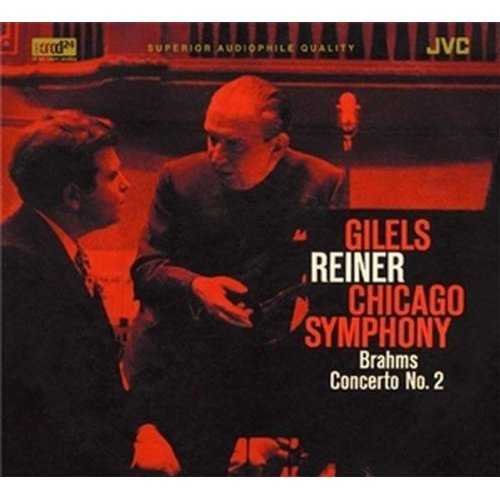
Composer: Johannes Brahms
Performer: Emil Gilels
Orchestra: Chicago Symphony Orchestra
Conductor: Fritz Reiner
Audio CD
Number of Discs: 1
Format: APE (tracks+cue)
Label: JVC / Xrcd
Size: 214 MB
Recovery: +3%
Scan: no
Piano Concerto No. 2 in B flat major, Op. 83
Composed by Johannes Brahms
Performed by Chicago Symphony Orchestra
with Janos Starker, Emil Grigoryevich Gilels
Conducted by Fritz Reiner
Gilels’ earlier version is a gem
This recording dates back to Gilels’ visit to the US in 1958. It was eclipsed in RCA’s catalog by Sviatoslav Richter’s recording of the piece in 1960 with the same orchestra under Eric Leinsdorf (Reiner was supposed to conduct but was ill). Richter’s recording got huge publicity and critical praise. Gilels had a much lower public profile than Richter: he was not as dramatic a figure, not as controversial, nor was he touted as being a genius. Gilels’ recording was rereleased on RCA’s low-priced Victrola label in 1964 and kicked around in RCA’s catalog for some time with little notice. It’s a shame; it is a fine performance.
Gilels and Reiner make a fine team. More a continuous conversation between piano and orchestra than the traditional showcase for the soloist, this piece requires a conductor who is more than an accompanist and a soloist who is willing to collaborate on a shared vision. Gilels and Reiner work hand-in-glove, taking a muscular, dynamic approach to the piece which emphasizes its classical form. Tempi are appropriate if a bit on the brisk side. The taut sound Reiner created with the Chicago Symphony is the perfect complement to Gilels’ clear and transparent pianism. Gilels keeps the lines crystal-clear, the structures evident, the emotions present but always held in balance, his sound big and still transparent. The third movement is a gem, a marvel of dynamic shading and light, lyrical touch. The clarity of sound and transparency of textures gives the performance a chamber-music feel, perfectly appropriate in a piece many commentators have likened more to chamber music than a traditional concerto.
The Chicago Symphony plays well, with commitment and passion as they always did for Reiner. RCA’s sound in its 1950’s early stereo recordings from Chicago was excellent for its time, and stands up very well even today.
I’ve had both this performance and the Richter/Leinsdorf in my collection since the late 1960’s in some form or other. While Richter does astonishing things with the first two movements, it is the Gilels’ performance I keep coming back to. To draw the distinction between the two performances broadly, Richter is more the romantic and Gilels is more the classicist — and since both strands are there in Brahms, both performances work well in their different ways. Gilels/Reiner is as close to a “classic” interpretation as I can find: balanced, clear, communicative and not prone to excesses in any direction. They are a more equal partnership than Richter and Leinsdorf; as much as Leinsdorf is a fine accompanist in that recording, he is an accompanist, not a real co-creator, and the performance shows it. And, for what it’s worth, I think the Chicago Symphony plays better for Reiner.
I have not heard Gilels’ later recording of this piece with Jochum so I cannot compare them. There is a feeling of “rightness” about this performance, and knowing what I do of Jochum’s conducting style, I would anticipate that performance to be more weighty but might not necessarily have that same chamber-music feel. Gilels/Reiner will stand up to rehearing after rehearing, year after year, and continue to show new marvels. It’s a shame that this extraordinarily expensive version is the only one currently available.




Thank you so much!!!!
thank you
Wonderful stuff, as always!!
Thanks!
Thank you very much. I have been hearing that this Gilels & Reiner combination is wonderful. I can hardly wait to hear this! Many thanks.
Great recording (and very good remastering). Too bad I already have it… ;)
One thing that might be interesting to mention is that the famous solo cello part in the beginning of the third mouvement is played by Janos Starker himself, as he was first cellist of the CSO at that time.
thank you! that is the comment i like to read here @boxset!
Thanks. :)
Greetings to you too, Sniffle :smile:
Great Thank You
thank yeou for this. And greets to sandflyer.
Just talked to a friend of mine – we came to the conclusion that RCA’s idea to record all the Russian artists (Richter, Gilels, Oistrakh…) that made their way to the USA in the 50s and 60s was one of the greatest achievements in the history of recorded music.
Then RCA acquired the Melodiya catalogue and the total objective was achieved… :-)
Excellent. Many thanks!
you are welcome